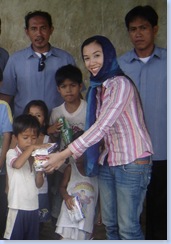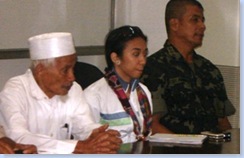"Once Upon A Time" is usually how writers begin their fairytale stories. Sometimes, with all the issues and challenging realities that our country has been facing, we wish we could be in a fairytale where there's always a happy ending. Life in this world is full of uncertainties. As we live each day of our lives, our society makes us ponder what exactly will happen to us at present and in the future. At the end of it all, we find ourselves questioning, "What is it that we really need in response to the prevailing problems in our country?" Actually, the answer is found deep within us. As responsible and concerned citizens, we should MAKE THINGS HAPPEN.
 There have been a lot of extra-ordinary people who have been true examples of good leadership and selflessness. As the Ramon Magsaysay Foundation (RMAF) would describe their awardees, these are people who embody 'greatness of human spirit' through 'selfless service to others.' Together with other young leaders, I was fortunate to have a dialogue with two of RMAF's laureates through the Ramon Magsaysay Foundation's Video Conference. This took place during the launching of its 50th Year Celebration as one of its highlights. This experience inspired me to take further steps in doing my work and to fulfill, which I believe is my mission.
There have been a lot of extra-ordinary people who have been true examples of good leadership and selflessness. As the Ramon Magsaysay Foundation (RMAF) would describe their awardees, these are people who embody 'greatness of human spirit' through 'selfless service to others.' Together with other young leaders, I was fortunate to have a dialogue with two of RMAF's laureates through the Ramon Magsaysay Foundation's Video Conference. This took place during the launching of its 50th Year Celebration as one of its highlights. This experience inspired me to take further steps in doing my work and to fulfill, which I believe is my mission.
As a young Muslim woman working in conflict areas in Mindanao through the Asia America Initiative (AAI), it was a risky step to take. But despite the risk, I know it's worth it especially when you have witnessed children and their families having to sacrifice and even perishing because of war. We all are aware that the path towards what we want our society to be may seem far-fetched. Some people have given up, while others are continuing to make their own steps for change even without certainty. However, despite our country's thorns, we should not give up. We have good people to emulate like the two laureates that we interacted with, Mr. Jon Ungphakorn and Arvind Kejriwal. They keep reminding us that positive change can actually happen. We can be of service to others within our own beliefs and spheres of influence.
Both of the Laureates believe that youth has great potential. I will share some remarkable statements by Mr. Ungphakorn and Mr. Kejriwal with my own title: " FIVE WAYS IN MAKING A DIFFERENCE THROUGH AN INTER-GENERATIONAL APPROACH."
(1) Attitude of the youth changes once they are immersed, have experienced and understand certain issues. Mr. Ungphakorn stated the Educational System should strongly support and encourage youth to volunteer and do community work. That makes me reflect on my work with AAI on peace and development in Mindanao . One of our programs called Catalysts for Peace encourages youth to be involved in peace-building. We believe that in order for youth to have an active role in peace initiatives, they should first be given proper knowledge and awareness in order to become effective advocates for peace.
 I conducted a study in college entitled ASSUMPTION AND MADRASAH EDUCATION: A Comparative Study on the Development of Human Values. I found that Muslim students do not know much about the Christian Culture and Christians know little about Muslim Culture, which is the main cause of prejudice. As a graduate of Assumption College , a Catholic School , I gained much insight that my classmates' thoughts about Muslims are mostly negative. They were surprised once they found out I am a Muslim. This applies with people I meet even today. I think if peace education classes are implemented in schools as early as Elementary and more interfaith sessions are available for immersion, we can change popular outlook and encourage more young people to be ambassadors for peace.
I conducted a study in college entitled ASSUMPTION AND MADRASAH EDUCATION: A Comparative Study on the Development of Human Values. I found that Muslim students do not know much about the Christian Culture and Christians know little about Muslim Culture, which is the main cause of prejudice. As a graduate of Assumption College , a Catholic School , I gained much insight that my classmates' thoughts about Muslims are mostly negative. They were surprised once they found out I am a Muslim. This applies with people I meet even today. I think if peace education classes are implemented in schools as early as Elementary and more interfaith sessions are available for immersion, we can change popular outlook and encourage more young people to be ambassadors for peace.
(2) Creating change is a long process. Mr. Ungphakorn added that the process should be constantly strengthened. More young people should be involved. I personally believe for the needed consistency, the younger generation should be mentored to partake in a continued process of coming up with solutions.
(3) We need to have an effective democracy, said Mr. Kejriwal. Lack of credible institutions only leads to change of faces but not true change. Just like what we see in the news, people have been looking for their own heroes to hear them out and help them. Some have been lucky while mostly are unfortunate. Credible institutions may help in this process.
(4) We should believe in the potential of the youth. If we can create an understanding of peace, we can create a better society. We should recognize the diversity of cultures and allow some form of autonomy to exist so that different sectors can have more control on their own. Promoting these values and raising awareness should be factored into providing an understanding of peace and diversity. Different institutions, especially schools, should implement this approach.
(5) There are issues commonly overlooked by mainstream media. We should also be the voice of the people at the grassroots level. One of the significant insights that I've had with my AAI mediation work and with my involvement in the Ayala Young Leaders, is that in order to serve and help others we must first listen to their needs. Even though the media's responsibility is to inform us on what's happening, it does not mean it is the whole story or even reality. We should not impose on others simply what we see on TV or hear on the radio. In the end, what really matters is whether we are able to assist those in need.
 Although these five points are simple and probably already known by most people, sometimes we need to be reminded to rekindle our spirits. Perhaps a dialogue with present day heroes like Mr. Ungphakorn and Mr. Kejriwal can motivate us to keep moving forward to selflessly serve others. Such experience has made me contemplate if I'm doing the right thing for my own people. It has caused me to evaluate if I need to take more steps to further my goals for the benefit of my community.
Although these five points are simple and probably already known by most people, sometimes we need to be reminded to rekindle our spirits. Perhaps a dialogue with present day heroes like Mr. Ungphakorn and Mr. Kejriwal can motivate us to keep moving forward to selflessly serve others. Such experience has made me contemplate if I'm doing the right thing for my own people. It has caused me to evaluate if I need to take more steps to further my goals for the benefit of my community.
Another perspective on selfless service is found in Islam. Similar to Christian beliefs, Allah taught that deep and abiding respect for those whom God has created is respect for God himself. If we desire the mercy and forgiveness of Allah then we must extend that to others. Selfless service is what Allah shows us in His words and His guidance for life through Islam. Inspiring thoughts expressed in various philosophies, including Islam and Christianity, show that we should continue with our mission for unity and peace. We were all born into this world for a purpose; we should create our own stories. With all of us working together, who knows, everything might just have a happy ending…
--
Rohaniza "Honey" Sumndad is the Philippines Officer-in-Charge and Program Coordinator of Asia America Initiative, Inc., which aims to promote peace and prosperity in conflict-ridden communities through people-to-people initiatives integrate health, education, arts and livelihood as a basis for mediation. Honey is also the Associate Editor of Starfish Magazine, a youth leadership magazine dedicated to the Filipino youth crafted by young servant leaders from all over the country.
Source: Changing Asia: The RMAF Blog

